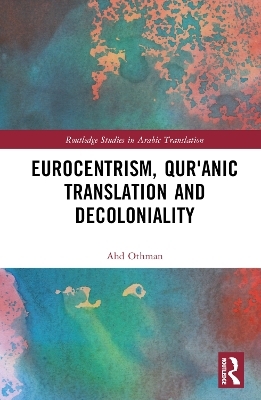
Eurocentrism, Qurʾanic Translation and Decoloniality
Routledge (Verlag)
978-1-032-52092-6 (ISBN)
This book calls for a deeper consideration of Eurocentrism as essential for several debates in the discipline, including its scientific character and future development. It claims that the angle of Arabic and Qurʾan translation is a valuable – and nearly unexploited – area where tensions in translation scholarship can play out in revealing ways. The book also draws connections between Eurocentrism, Qurʾan translation and decolonial thought in order to highlight ‘decoloniality’ as a useful framework for imagining a post-Eurocentric discipline.
The book will appeal to scholars and postgraduate students and researchers interested in Translation Studies, particularly within the areas of Arabic, Qurʾanic, Islamic and religious translation.
Ahd Othman, Visiting Research Associate at the University of Bristol
Arabic transliteration key
Acknowledgements
Introduction
Chapter I – Eurocentrism: a conceptual framework
1.1 Europe as a cultural unity
1.2 Greece and Rome
1.3 The Judeo-Christian tradition
1.4 Enlightenment and science
1.5 European superiority: solipsism and power
Eurocentrism’s problems in TS
1.6 Reservations about the critique of Eurocentrism
Conclusion
Chapter II – Quantifying Eurocentrism: a bibliometric approach
2.1 Sampling Arabic translation
2.2 Bibliometrics
2.3 Quantifying Eurocentrism
2.4 Scope of data and tools
2.5 Data results and analysis
2.5.1 The Bibliography of Interpreting and Translation (BITRA)
2.5.2 The Translation Studies Bibliography (TSB)
Limitations of the bibliometric approach
2.6 Methodologies, scientificity and Eurocentrism
The qualitative-quantitative divide
Conclusion
Chapter III – Eurocentrism through a qualitative lens: the case of Qurʾan translation
3.1 Sampling Qurʾan translation
3.2 Thematic Analysis
3.3 Themes and subthemes identified in the articles
3.3.1 Qurʾan translation with biblical touchstones
(a) Christian translators’ key role in Qurʾan translation history
(b) Biblical referentiality
(c) (Un)translatability
(d) Linguistic focus and Translation Quality Assessment (TQA)
3.3.2 Politics of representation
(e) The Qurʾan in the scheme of things
(f) Regimes of epistemic authority
(g) Macro-narratives
Conclusion
Chapter IV – Decoloniality, liberation theology and translation
4.1 Reference works
4.2 Decoloniality and Translation Studies
4.3 Decoloniality and liberatory Islam
Islamic liberation theology
4.4 Tawhid and Qurʾan translation
Implications for translation
4.5 Other ‘others’
Conclusion
Concluding remarks
Appendix 1: 50 most frequent words in the ‘subject’ field of the BITRA sample
Appendix 2: 25 most frequent words in the ‘keyword’ field of the TSB sample
Appendix 3: Codes generated and compiled after the first coding sweep
Appendix 4: Codes refined and grouped after the second coding sweep
Index
| Erscheinungsdatum | 23.02.2024 |
|---|---|
| Reihe/Serie | Routledge Studies in Arabic Translation |
| Zusatzinfo | 7 Tables, black and white; 6 Line drawings, black and white; 6 Illustrations, black and white |
| Verlagsort | London |
| Sprache | englisch |
| Maße | 156 x 234 mm |
| Gewicht | 553 g |
| Themenwelt | Schulbuch / Wörterbuch ► Wörterbuch / Fremdsprachen |
| Geisteswissenschaften ► Religion / Theologie ► Islam | |
| Geisteswissenschaften ► Sprach- / Literaturwissenschaft ► Anglistik / Amerikanistik | |
| Geisteswissenschaften ► Sprach- / Literaturwissenschaft ► Literaturwissenschaft | |
| Geisteswissenschaften ► Sprach- / Literaturwissenschaft ► Sprachwissenschaft | |
| ISBN-10 | 1-032-52092-2 / 1032520922 |
| ISBN-13 | 978-1-032-52092-6 / 9781032520926 |
| Zustand | Neuware |
| Haben Sie eine Frage zum Produkt? |
aus dem Bereich


